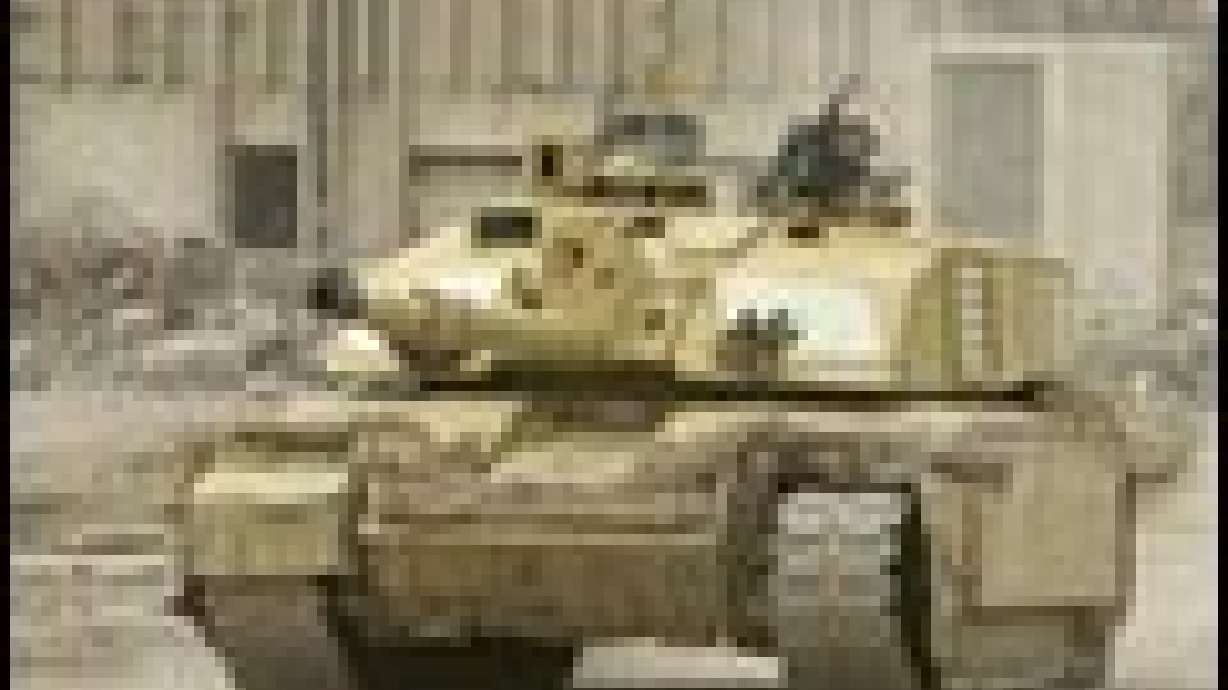Estimated read time: 4-5 minutes
This archived news story is available only for your personal, non-commercial use. Information in the story may be outdated or superseded by additional information. Reading or replaying the story in its archived form does not constitute a republication of the story.
BASRA, Iraq (AP) -- British forces took control of the heart of Basra on Monday, met by few pockets of resistance and greeted by hundreds of people who shook their hands and welcomed them to Iraq's second-largest city.
Royal Marine commandos seized a vacant, pink-hued marble palace belonging to President Saddam Hussein. Elsewhere in the impoverished city, there was widespread looting in the city's narrowing streets, and even reports of some retaliatory attacks by Iraqis against militiamen still loyal to Saddam.
"The last 48 hours have been historic for Basra. After decades under the heel of Saddam's brutal regime, U.K. forces are in the process of delivering liberation to the people of Basra," Air Marshal Brian Burridge told reporters in Qatar.
"There will be some difficult days ahead, but the Baathist regime is finished in Basra."
For two weeks, the British had held off from storming the city of 1.3 million people to avoid civilian casualties in what they feared would become bloody urban fighting against Saddam's Fedayeen fighters and other loyalists.
Commanders also had hoped to use the time to gain the trust of local residents, mainly Shiite Muslims, who had been crushed by Saddam's Sunni government after an uprising at the end of the 1991 Gulf War.
But local resistance to allied forces weakened and, in an airstrike Saturday in Basra, one of the most brutal members of Saddam's inner circle, Ali Hassan al-Majid, was believed to have been killed in his home. He had been dubbed "Chemical Ali" by opponents for ordering a 1988 poison gas attack that killed thousands of Kurds.
Troops broke down the doors to the ornate palace, finding carved teak woodwork, marble floors, vaulted ceilings and stained-glass windows. The palace, which apparently had been unoccupied for months, was empty except for a flock of doves.
At the Central Bank of Iraq, Basra residents streamed out carrying chairs, tables and carpets. A group of looters targeted schools and shops and one man walked with a chandelier under his arm. And at the Sheraton Hotel, people loaded chairs and sofas into horse-drawn carts. Some even wheeled the hotel's grand piano down a street.
Military officials said they were more concerned that ammunition would be looted and used in the sporadic fighting that continued as they tightened their grip on the city.
Gunfire could be heard throughout the day and a half-dozen attack helicopters buzzed overhead. Inside Basra's College of Religious Literature, which British troops seized Sunday, more than 250 mortars, rocket-propelled grenades and machine guns were found.
"We know local militia have been ordered not to wear their uniforms. There are arms caches everywhere. They fire at us, lay down their arms, wave a white flag, and move on," said Capt. Niall Brennan of the Irish Guards.
The success of the troops saw a brutal response from some civilians. Several militiamen were seen being killed by throngs of civilians, Press Association said. A British soldier was also told that civilians had killed a policeman, according to British press pool reports.
On Sunday, British officials made a massive push into the city.
The Royal Scots Dragoon Guards advanced in Challenger 2 tanks and the Black Watch invaded in armored vehicles, while the Royal Regiment of Fusiliers pushed in from the southwest, and Royal Marine commandos came in from the south, according to Press Association.
The original objective was to take the outskirts but resistance was found to be light, so the British forces advanced quickly.
The 7th Armored Brigade, or the Desert Rats, killed an unknown number of paramilitary fighters and took others prisoner as the unit pushed in from the west. Commanders said the bulk of Iraqi forces may have fled 48 hours before the latest incursion, according to British pool reports.
The Defense Ministry said three British soldiers were killed Sunday.
On Monday, the 3rd Battalion Parachute Regiment took up foot patrol in the city center after a massive convoy of British infantry started rolling into Basra from the southern outskirts earlier in the day.
The paratroopers had been warned that resisters would use balconies, alleyways and hidden alcoves of the old town to mount surprise attacks. But, as they walked into old Basra, they saw the area was clear.
"Saddam destroyed everything. He destroyed the water, he destroyed the people. The people of Basra are very happy today," said one man, who refused to give his name, giving a thumbs up to a passing soldier.
Hundreds of people poured out to welcome and shake hands with the soldiers. Women in chadors hovered in the background, and soldiers talked and joked with civilians and let some boys look through their gunsights.
The humanitarian situation remained bleak, with many residents desperate for fresh water.
"All the citizens are very thirsty," said a man who would only identify himself as Ali. He was holding his year-old daughter.
"I feel very afraid for her, and for my friend's baby," he said. "I've been without water for three days."
(Copyright 2003 by The Associated Press. All Rights Reserved.)









